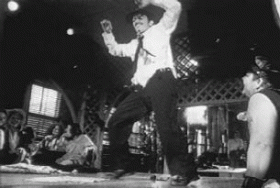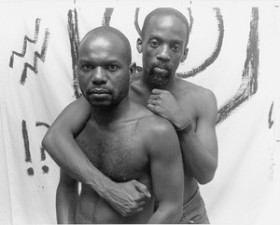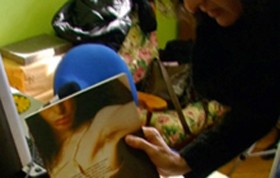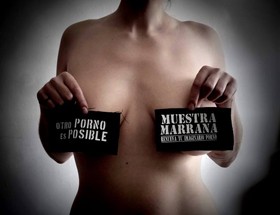Nightcleaners Part 1 was a documentary made by members of the Berwick Street Collective (Marc Karlin, Mary Kelly, James Scott and Humphry Trevelyan), about the campaign to unionize the women who cleaned office blocks at night and who were being victimized and underpaid. Intending at the outset to make a campaign film, the Collective was […]
Bruce LaBruce: The Raspberry Reich (2004)
The Raspberry Reich is a 2004 film by director Bruce LaBruce which explores what LaBruce calls “terrorist chic”, cult dynamics, and the “innate radical potential of homosexual expression”.It is about a contemporary terrorist group who set out to continue the work of the Red Army Faction (RAF), also known as the Baader-Meinhof Gang. The group […]
Harriet Dodge/Silas Howard: By Hook or by Crook (2001)
By Hook or by Crook chronicles the tale of two unlikely friends who commit petty crimes as they search for a path to understanding themselves and the outside world. Silas Howard plays Shy, (a Transgender man) who leaves his small town after the death of his father, and heads to the big city to live a life of crime. Along the way, he encounters Valentine, a quirky adoptee, in search of his birth mother. An immediate kinship is sparked between these men and they become partners in crime. Suffering money troubles, emotional problems, and physical confrontations, the duo face their issues head on and learn to trust each other and support each other in pursuit of their goals.
Zemirah Moffat: Mirror, Mirror (2009)
Queer Giving is the material realisation of a practice-led research project into contemporary radical queer ways of being. It is one thesis composed of the film Mirror Mirror and the paper One Queer Gift. They are derivatives of my ethnographic investigation into the radical queer vision of London’s Club Wotever (2003-). Working within the potentials of their respective forms, both film and paper argue that radical queer identities, as found in the major urban centres of the metropolitan West, derive their multiple-meanings, integrity and raison d’etre within and through dialogue. Characterised by audio-visual provocation and cautious disclosure, Mirror Mirror reflects this formative feedback through its text and narrative drive.
Kimberly Peirce: Boys Don’t Cry (1999)
Boys Don’t Cry is a 1999 American independent romantic drama film directed by Kimberly Peirce and co-written by Andy Bienen. The film is a dramatization of the real-life story of Brandon Teena, a trans man played in the film by Hilary Swank, who is beaten, raped and murdered by his male acquaintances after they discover he is transgender. The film explores the themes of freedom, courage, identity and empowerment.
Bruce LaBruce: Super 8 1/2 (1993)
LaBruce stars in this vaguely autobiographical look at a triple-X star-director caught in the downward spiral of his career. Remarks Googie, the art-house auteur who’s either exploiting LaBruce or launching his comeback, “He was actually attempting to break down the whole subject-camera relationship… It was as if he was an existentialist trapped in a porno star’s body.” Well, almost.
Porn, Prostitution, Citizenship, and Nationalism
Panel “Porn, Prostitution, Citizenship, and Nationalism” from CLAGS’ conference Homonationalism and Pinkwashing at The Graduate Center, CUNY, New York City, April 10-11, 2013. For more information about the conference, see the conference website: http://www.homonationalism.org. For more information about CLAGS, see our website: http://www.clags.org. Moderator: David Gerstner, CUNY Presentations: 1. Sexual Citizenship: From Place to Race […]
Yang Yang: Our Story – 10-year “guerrilla warfare” of Beijing Queer Film Festival (2011)
In 2001 three students of Peking University in Beijing held the first gay and lesbian film festival. The festival was brought to a halt by the university authorities during the opening event. This was a foretaste of what was to follow during the next ten years, in which the festival has battled against the oppressive […]
Laura Cottingham: Not For Sale (1998)
A video essay uses primary footage to document the stories, challenges and acheivements of the women who, in the 1970s, attempted to transform the underlying tenets of fine art of fine art beyond terms dictated by a sexist ideology. Includes over 100 visual artists.
Marina Gržinić/Aina Šmid: The Threat of the Future (1983)
With the song by Yello “Pin ball cha cha” and the singer that invites us to watch by singing “Come, come closer to me, I tell you man you will see…” we enter in the dance performed by Marina Grzinic. The public is in relation to the dance as in a peep show, implying a pornographic camera eye but as well a certain cannibalisation/pornographic perpetuation of our lives by the law and mass media that from 1980s will transform the paradigm of society and discipline into society and control. Therefore we have a duplication of roles, Marina Grzinic and Aina Smid in front of the camera as in some kind of cinema verite (talking about their sexual lives and lesbian attitudes) and Grzinic/ Smid on the TV behind them as a night show.
Politicizing Trans/Trans_forming Politics
| Organized by | Lann Hornscheidt, Tamás Jules Fuetty, Ja’n Sammla, Rüzgår Gökçe Buşki and Stephanie Urgast. Centre for Transdisciplinary Gender Studies, Humboldt University, Berlin, Germany in collaboration with InterGender (Swedish-International Research School in Interdisciplinary Gender Studies), Linköping University, Sweden. This seven-day lab, consisting of workshops, a lecture series, an artistic exhibition and a party […]
Chen Kaige: Farewell My Concubine (1993)
Farewell My Concubine is a 1993 Chinese drama film directed by Chen Kaige, is one of the central works of the Fifth Generation movement that brought Chinese film directors to world attention. Similar to other Fifth Generation films like To Live and The Blue Kite, Farewell My Concubine explores the effect of China’s political turmoil during the mid-20th century on the lives of individuals, families, and groups, in this case, two stars in a Peking opera troupe and the woman who comes between them.




